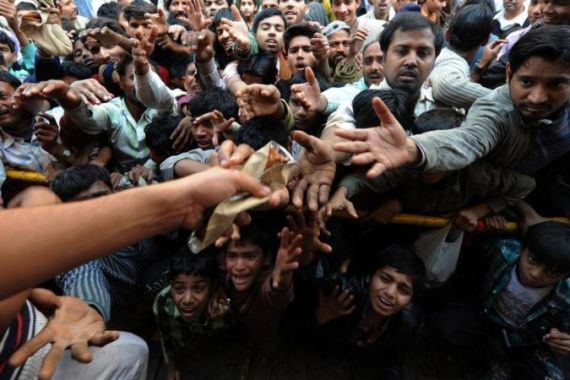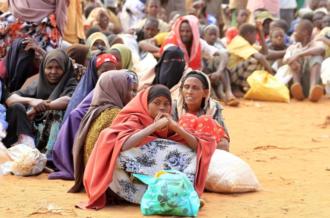Betting the farm on hunger
Debate heats up whether financial speculation is spiking food prices and spelling disaster for millions of poor people.

Financial investors betting on the price of food are dangerously driving up prices, threatening millions of impoverished people in food-importing countries who will go hungry, critics warn.
But the issue of food speculation by banks, hedge and pension funds is a controversial one, and many observers say there is no evidence that gambling on food causes price increases and volatility.
Keep reading
list of 4 itemsChina’s economy beats expectations, growing 5.3 percent in first quarter
Inside the pressures facing Quebec’s billion-dollar maple syrup industry
Manipur’s BJP CM inflamed conflict: Assam Rifles report on India violence
Opponents are demanding that G-20 leaders take urgent action to halt agriculture commodity speculation, after summer drought ravaged US corn crops, and lower-than-expected wheat yields in Russia, Ukraine and Kazakhstan.
Activists say while nothing can be done about the effects of drought devastation on prices, the trade of agricultural financial products can – and must – be immediately halted.
About one billion people around the globe already go hungry. It is predicted the number will jump by 53 million by the end of 2012, according to the UN World Food Programme.
Countries in the Middle East and north and sub-Saharan Africa are most vulnerable to the latest global food-price spike, the third in five years. Some analysts are warning food riots – similar to those that erupted in 2008 and 2010 – could be on the horizon.
In just one year, maize prices have jumped by 174 per cent in Malawi and 129 per cent in Mozambique. Wheat prices have surged 52 per cent in Sudan since July 2011, according to the World Bank.
Financial speculation is “among the various drivers of increased price levels and volatility”, according to a recent release by three UN agencies.
G-20 officials are discussing the issue and could call an emergency meeting to try to head off a potential global food crisis.
But some are sceptical any real action will be taken. If an emergency meeting is called, expect “nothing from the G-20 on financial speculation”, Simon Evenett, professor of international trade at the University of St Gallen, Switzerland, told Al Jazeera.
France’s Agriculture and Food Minister Stephane Le Foll has blamed skyrocketing prices partly on excessive food speculation. He urged taxation of financial transactions and “position limits” – which cap the amount speculators are allowed to invest.
“There have been transfers, speculators leaving other markets to come to food markets. We need to stop this,” Le Foll recently told French television.
Others sceptical
While some point a finger directly at agriculture speculation as playing a significant role in food-price spikes, others deny any such link.
“At most, financial speculation has been a minor aggravating factor,” Evenett said.
Peter Schiff, an economist and CEO of Euro Pacific Capital, said agricultural trading does not affect prices, and halting the practice could compound the problem.
“If you took all the speculators out of the market, the prices might even be higher,” Schiff told Al Jazeera’s Inside Story.
Shenggen Fan, director general of the International Food Policy Research Institute, said “the evidence so far is inconclusive”, when asked if speculation was driving up prices.
But others contend with ample food supplies over the past few years, the volatility and price surges cannot be explained by supply and demand alone.
Using a complex computer model that identifies global trends, scientists at the New England Complex Systems Institute say they have pinpointed speculation as a key culprit in rising food prices and volatility in recent years.
The institute’s professor Yaneer Bar-Yam said drought, the use of vast amounts of corn for ethanol, and “rampant” commodity speculation threaten an immediate and “massive price shock”.
Meanwhile, several major investment banks have quietly stopped such trading.
Germany’s Commerzbank, Landesbank Baden-Württemberg, and Dekabank halted offering investment funds linked to basic food commodities. Austria’s Volksbanken recently followed suit.
|
Inside Story: Are we heading for a global food crisis? |
The motivation for stopping the betting on food is unclear. When asked why, only Commerzbank responded. “We decline to comment on the reason for our decision,” said Claire Tappenden from corporate communications.
Christine Haigh from the World Development Movement told Al Jazeera the banks’ move was cosmetic, and could be reversed any time when the controversy cools down.
“It’s more of a PR exercise than real concern over commodity prices. It’s smart for them to say we’re going to pull out,” Haigh said.
How it works
Commodities speculators don’t actually buy any physical goods. They purchase “futures contracts”, or similar financial instruments, that allow farmers to agree on a guaranteed price with a buyer for their next harvest well in advance – a kind of insurance policy against price fluctuations and poor harvests.
For their part, speculators aim to make money by buying and holding on to the futures contracts, seeking to profit from changing prices. Proponents say speculation brings much-needed liquidity into the market and stabilises it.
Food speculation was previously done by small farmers and a limited number of traders. But after financial deregulation by governments in the United States and Europe in the 1990s, large investment firms and hedge funds jumped in.
|
“Markets don’t have morals … Markets care about people’s ability to pay for food, not their need for it.” – Christine Haigh, World Development Movement |
The portion of speculative trading on commodity futures has surged from about 30 per cent in 2000 to 80 per cent today, according to German NGO foodwatch. In cash terms, the amount of investment has nearly doubled from $65bn to $126bn over the past five years.
Critics argue excessive commodity speculation over the past decade has raised prices, without reflecting supply and demand for actual food.
If futures contracts prices are high, then the price of physical commodities also rises, says the World Development Movement.
In an 88-page report titled “The Hunger-Makers”, foodwatch said traditional speculators were influenced by supply-and-demand factors, but today’s financiers are not.
“They continuously buy over a longer period of time without selling. This artificially raises futures contracts prices, and effectively hikes spot prices, or the cost of actual food, as well.”
Starvation as ‘opportunity’
The poor are the most vulnerable to food price hikes in countries that rely on imports. Even a 1 per cent jump means 16 million people are plunged into poverty, according to Oxfam.
| ||
“Even very modest price increases can be a matter of life or death in countries where families spend up to 80 per cent of their income for food,” foodwatch’s report said.
With prices skyrocketing, opponents of food speculation say making money off people’s misery is morally reprehensible.
Chris Mahoney, agriculture director for commodity trader Glencore, recently told reporters the US drought would be good for business. “High prices, a lot of volatility, a lot of dislocation, tightness, a lot of arbitrage opportunities,” said Mahoney.
Attitudes such as these define the core problem with food today, said Haigh. Corporate control over the global food system needs to stop, she said.
“Markets don’t have morals,” Haigh said. “The fundamental issue is markets care about people’s ability to pay for food, not their need for it. We need to radically reform these power dynamics.”
